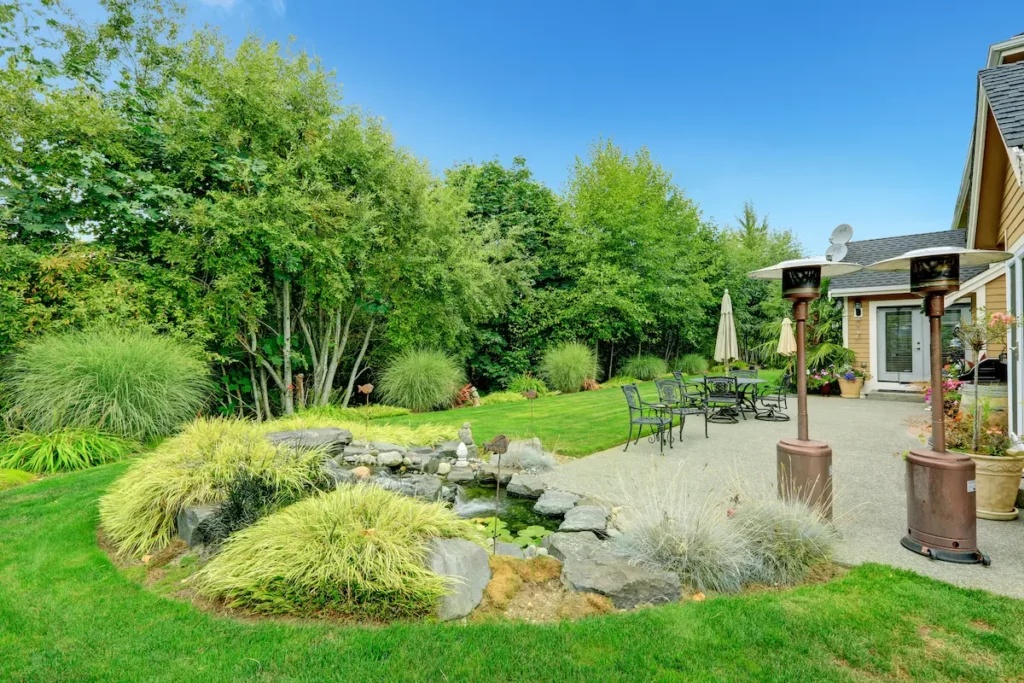A conversion kit is needed to swap the heater to convert a propane heater to natural gas.
You may have received a high gas bill and wondering how to reduce costs.
Converting your propane heater to natural gas is a cost-effective and safer option, but it will impact the environment.
More people are switching to natural gas. Learn how to make the transition.

Related Reading: How Long Do Propane Tanks Last For Patio Heaters?
Table of Contents
Parts You Will Need to Convert a Propane Heater to Natural Gas
Most appliances can run on either propane or natural gas. To switch fuel types, the appliance fittings must be changed.
Check if your appliance includes a kit for swapping pieces. If not, contact the manufacturer to inquire about availability.
Swapping out fittings and components of a gas appliance is necessary due to pressure differences.
Propane gas has a pressure of 0.36-0.40 psi, while natural gas has a pressure of 0.25 psi.
Need a Professional
It may seem easy to change out the fittings, but adjusting the regulators and burners requires expertise.
When dealing with gas, it’s best to leave it to the professionals. Get the setting wrong and it could be disastrous for you.
It’s important to have a professional gas technician handle this part of the job. Call your manufacturer for a recommended technician.
Some Appliances are Challenging to Convert
Gas appliances are increasingly becoming available on the market, but many are difficult to convert.
The industry is trying to discourage DIYers from converting a propane heater to natural gas.
However, this doesn’t mean that it’s impossible to convert them. It simply means letting the experts handle it for you is best.
Some appliances, like water heaters, can’t be converted and must be replaced.
Cost of Converting a Propane Heater to Natural Gas
It can be expensive if you need to replace a propane gas appliance in your home. Therefore, it’s essential to consider the cost-benefit of switching to natural gas.
It’s important to consider the long-term cost of using natural gas.
Propane gas generates twice as much heat as natural gas, meaning you’ll need less gas to warm your home.
This can lead to significant savings on your utility bill.
If natural gas is available in your area, you may need to have the gas line extended to your home, which may require excavating your property to lay down the necessary pipes.
It’s important to keep in mind that the cost of installing natural gas can add up quickly.
Going from a propane heater to natural gas can be a worthwhile investment in the long run, despite requiring an initial outlay, as it pays off after around 15 years.
Related Reading: Patio Heater Coverage Explained: How to Best Warm Your Space
What to Do With Your Propane Tank
When you switch to natural gas, your propane tank becomes unnecessary. Depending on its location on your property, you may need to dig it out.
However, you can choose to leave it buried underground. Ultimately, your decision should be based on your situation.
If the gas tank belongs to a utility company, they may want it back. You must arrange with the gas company to at least empty the tank.
The Pros and Cons of Natural Gas
There are advantages and disadvantages to using natural gas and propane gas. Let’s compare them.
Pros:
- It’s Always Available: Nothing is more frustrating than having your gas run out when you are in the middle of cooking. Or the heater flickers and then stops because it’s used up the last supply of your propane. You don’t have to worry about the availability of natural gas. It’s always ready when you are.
- It Can Be Cheaper Than Propane: In the previous section, we discussed the cost of switching from propane to natural gas. Natural gas is typically cheaper than propane, with potential savings of up to 30%.
- Dissipates Quicker in the Environment: Natural gas is lighter than propane, dissipating more quickly into the environment. This provides reassurance to those who are concerned about gas emissions.
Related Reading: Summit Natural Gas-Benefits of Natural Gas
Cons
- Contains Methane: Although propane and natural gas are environmentally friendly, natural gas primarily comprises methane. As a greenhouse gas, methane contributes to global warming through a process known as methane oxidization, which converts the gas into water and carbon dioxide (CO2). While the water is harmless, the CO2 is responsible for damaging the environment, and methane is the source of it.
- Less Energy Efficient: Gas energy is measured in British Thermal Units (BTUs). Propane gas can release 2,516 BTUs, which is twice as efficient as natural gas, releasing only 1.030 BTUs. This is important when you need fast heating for food and water.
- More Significant Risks: Both propane and natural gas are highly flammable, but the potential for gas leaks is the real danger with natural gas. Imagine a network of pipes running throughout your neighborhood, with one of those pipes connected to your house. Maintaining this infrastructure is significant, given the hardware involved in supplying gas to you and your neighbors.
The responsibility lies with either your local government or the gas company that owns the pipelines. A faulty pipe that is missed in an inspection can potentially create widespread disaster.
Propane gas can avoid this situation, as the tank and gas line are confined to your property. Any leaks or worn-out pipes are limited to your house and yard, reducing safety risks.
Continue Reading: Best Natural Gas Patio Heaters [REVIEWED]
Conclusion
As more homes access natural gas, switching from a propane heater to natural gas can be a practical choice.
To convert your appliance to natural gas, you must change the fittings and have a professional adjust the regulators and burners.
The advantage of using natural gas is that it offers a reliable and constant fuel supply. Additionally, it can be a cost-effective option in the long run.
Although natural gas is considered a safe fuel, it has some drawbacks.
One of the main concerns is that it contains methane, which can hurt the environment by contributing to climate change through the production of CO2.
Additionally, converting your appliances to natural gas and removing your existing propane tank can be costly, resulting in a significant financial investment.
Good luck in making the best decision for your situation. Hopefully, this information helped.
Enjoy living the outdoor life!!!

